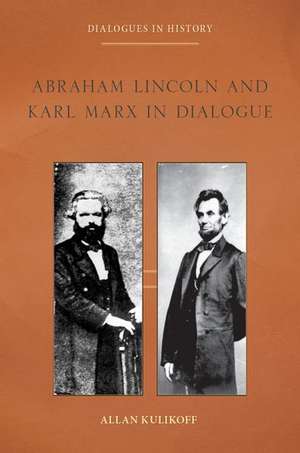Abraham Lincoln and Karl Marx in Dialogue: Dialogues in History
Autor Allan Kulikoffen Limba Engleză Hardback – 23 aug 2018
| Toate formatele și edițiile | Preț | Express |
|---|---|---|
| Paperback (1) | 200.70 lei 3-5 săpt. | |
| Oxford University Press – 23 aug 2018 | 200.70 lei 3-5 săpt. | |
| Hardback (1) | 683.01 lei 32-37 zile | |
| Oxford University Press – 23 aug 2018 | 683.01 lei 32-37 zile |
Preț: 683.01 lei
Preț vechi: 942.15 lei
-28% Nou
Puncte Express: 1025
Preț estimativ în valută:
130.76€ • 135.91$ • 108.41£
130.76€ • 135.91$ • 108.41£
Carte tipărită la comandă
Livrare economică 27 ianuarie-01 februarie 25
Preluare comenzi: 021 569.72.76
Specificații
ISBN-13: 9780190844646
ISBN-10: 0190844647
Pagini: 152
Ilustrații: 9 hts
Dimensiuni: 236 x 160 x 15 mm
Greutate: 0.41 kg
Editura: Oxford University Press
Colecția OUP USA
Seria Dialogues in History
Locul publicării:New York, United States
ISBN-10: 0190844647
Pagini: 152
Ilustrații: 9 hts
Dimensiuni: 236 x 160 x 15 mm
Greutate: 0.41 kg
Editura: Oxford University Press
Colecția OUP USA
Seria Dialogues in History
Locul publicării:New York, United States
Recenzii
A highly teachable text that prompts readers to think about the U.S. Civil War as an international event and serves as a primer on free labor and Marxist thought. Kulikoff 's introductory essay and his selections are superb; they concisely illuminate the similarities and the differences between free-labor ideology and Marx's theories.
Allan Kulikoff has done something ingenious. He has brought together in dialogue the president who presided over the capitalist revolution against slavery and the communist who called for capitalism's destruction. The result is clever, fascinating, and, because it's Kulikoff, insightful.
To Karl Marx's communists, Abraham Lincoln was the heroic 'single-minded son of the working class' who led his nation's struggle against slavery. Lincoln likened that struggle to the cause of the great European revolutions. Seeing the convergences as well as the clashes of these fundamentally different men, Allan Kulikoff illuminates two great minds making sense of the injustice and inequality of their time.
Kulikoff masterfully imagines how Marx and Lincoln viewed each other's decisions, proposals, policies, and perspectives with regard to capitalism and slavery. The book is a splendid and valuable exploration of critical issues that dominated the antebellum period and informed debates across borders, time and space.
This is a most imaginative and useful contribution to the study of the causes and consequences of the Civil War and to the debates on slavery, emancipation, and free labor. Counterposing the writings, speeches, and correspondence of two influential contemporaries
Allan Kulikoff has done something ingenious. He has brought together in dialogue the president who presided over the capitalist revolution against slavery and the communist who called for capitalism's destruction. The result is clever, fascinating, and, because it's Kulikoff, insightful.
To Karl Marx's communists, Abraham Lincoln was the heroic 'single-minded son of the working class' who led his nation's struggle against slavery. Lincoln likened that struggle to the cause of the great European revolutions. Seeing the convergences as well as the clashes of these fundamentally different men, Allan Kulikoff illuminates two great minds making sense of the injustice and inequality of their time.
Kulikoff masterfully imagines how Marx and Lincoln viewed each other's decisions, proposals, policies, and perspectives with regard to capitalism and slavery. The book is a splendid and valuable exploration of critical issues that dominated the antebellum period and informed debates across borders, time and space.
This is a most imaginative and useful contribution to the study of the causes and consequences of the Civil War and to the debates on slavery, emancipation, and free labor. Counterposing the writings, speeches, and correspondence of two influential contemporaries
Notă biografică
Allan Kulikoff is the Abraham Baldwin Distinguished Professor in the Humanities Emeritus at the University of Georgia. He is the author of several books, including The Agrarian Origins of American Capitalism.


